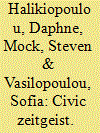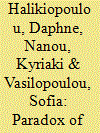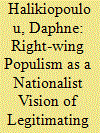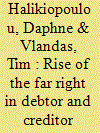|
|
|
Sort Order |
|
|
|
Items / Page
|
|
|
|
|
|
|
| Srl | Item |
| 1 |
ID:
120360


|
|
|
|
|
| Publication |
2013.
|
| Summary/Abstract |
This article examines the relationship between nationalism and liberal values and, more specifically, the redefinition of boundaries between national communities and others in the rhetoric of radical right parties in Europe. The aim is to examine the tension between radical right party discourse and the increasing need to shape this discourse in liberal terms. We argue that the radical right parties that successfully operate within the democratic system tend to be those best able to tailor their discourse to the liberal and civic characteristics of national identity so as to present themselves and their ideologies as the true authentic defenders of the nation's unique reputation for democracy, diversity and tolerance. Comparing the success of a number of European radical right parties ranging from the most electorally successful Swiss People's Party, the Dutch Pim Fortuyn List and Party for Freedom to the more mixed French Front National, British National Party and National Democratic Party of Germany we show that the parties that effectively deploy the symbolic resources of national identity through a predominantly voluntaristic prism tend to be the ones that fare better within their respective political systems. In doing so, we challenge the conventional view in the study of nationalism that expects civic values to shield countries from radicalism and extremism.
|
|
|
|
|
|
|
|
|
|
|
|
|
|
|
|
| 2 |
ID:
141658


|
|
|
|
|
| Summary/Abstract |
Greece’s economic instability has become the Western world’s longest-running monetary crisis. Will Germany allow the EU to keep propping up Greece’s unstable financial system? Will the country leave the eurozone? Will such a departure, if it occurs, unravel the idea of “Europe”? All valid questions. But behind them stands another equally profound social and political crisis that has made Greece the weak man of Europe.
|
|
|
|
|
|
|
|
|
|
|
|
|
|
|
|
| 3 |
ID:
113139


|
|
|
|
|
| Publication |
2012.
|
| Summary/Abstract |
What can explain the strong euroscepticism of radical parties of both the right and the left? This article argues that the answer lies in the paradoxical role of nationalism as a central element in both party families, motivating opposition towards European integration. Conventionally, the link between nationalism and euroscepticism is understood solely as a prerogative of radical right-wing parties, whereas radical left-wing euroscepticism is associated with opposition to the neoliberal character of the European Union. This article contests this view. It argues that nationalism cuts across party lines and constitutes the common denominator of both radical right-wing and radical left-wing euroscepticism. It adopts a mixed-methods approach, combining intensive case study analysis with quantitative analysis of party manifestos. First, it traces the link between nationalism and euroscepticism in Greece and France in order to demonstrate the internal validity of the argument. It then undertakes a cross-country statistical estimation to assess the external validity of the argument and its generalisability across Europe.
|
|
|
|
|
|
|
|
|
|
|
|
|
|
|
|
| 4 |
ID:
167234


|
|
|
|
|
| Summary/Abstract |
Right-wing populist parties have significantly increased their electoral support in recent years. This has also triggered an increase in scholarly interest in the topic. Most existing explanations focus on demand, putting forward different versions of a cultural grievance story underpinned by a common focus on immigration. Instead, in order to understand the rise of right-wing populism, the focus must also be on the supply side and more specifically on the ways right-wing populists themselves attempt to make their message more appealing to broader sectors of the population. At the core of this argument is nationalism: the examples of the German AfD and the French FN show that the adoption of a predominantly civic nationalist rhetoric allows these parties to appear legitimate to a broad range of social groups with different backgrounds and preferences.
|
|
|
|
|
|
|
|
|
|
|
|
|
|
|
|
| 5 |
ID:
138886


|
|
|
|
|
| Summary/Abstract |
While the 2014 European Parliament elections were marked by the rise of parties on the far right-wing, the different patterns of support that we observe across Europe and across time are not directly related to the economic crisis. Indeed, economic hardship seems neither sufficient nor necessary for the rise of such parties to occur. Using the cross-national results for the 2004, 2009 and 2014 EP elections in order to capture time and country variations, we posit that the economy affects the rise of far right-wing parties in more complex ways. Specifically, we compare the experience of high-debt countries (the ‘debtors’) and the others (the ‘creditors’) and explore the relationship between far right-wing party success on the one hand, and unemployment, inequality, immigration, globalisation and the welfare state on the other. Our discussion suggests there might be a trade-off between budgetary stability and far right-wing party support, but the choice between Charybdis and Scylla may be avoided if policy-makers carefully choose which policies should bear the brunt of the fiscal adjustment.
|
|
|
|
|
|
|
|
|
|
|
|
|
|
|
|
| 6 |
ID:
135879


|
|
|
|
|
| Summary/Abstract |
The May 2014 European Parliament (EP) elections were characterised by the success of far-right Eurosceptic parties, including the French Front National, UKIP, the Danish People's Party, the Hungarian Jobbik, the Austrian FPÖ, the True Finns and the Greek Golden Dawn. However, a closer look at the results across Europe indicates that the success of far-right parties in the EP elections is neither a linear nor a clear-cut phenomenon: (1) the far right actually declined in many European countries compared to the 2009 results; (2) some of the countries that have experienced the worst of the economic crisis, including Spain, Portugal and Ireland, did not experience a significant rise in far-right party support; and (3) ‘far right’ is too broad an umbrella term, covering parties that are too different from each other to be grouped in one single party family.
|
|
|
|
|
|
|
|
|
|
|
|
|
|
|
|
|
|
|
|
|